Two Amazing Reasons that Keeping Chickens can be Great for your GARDEN
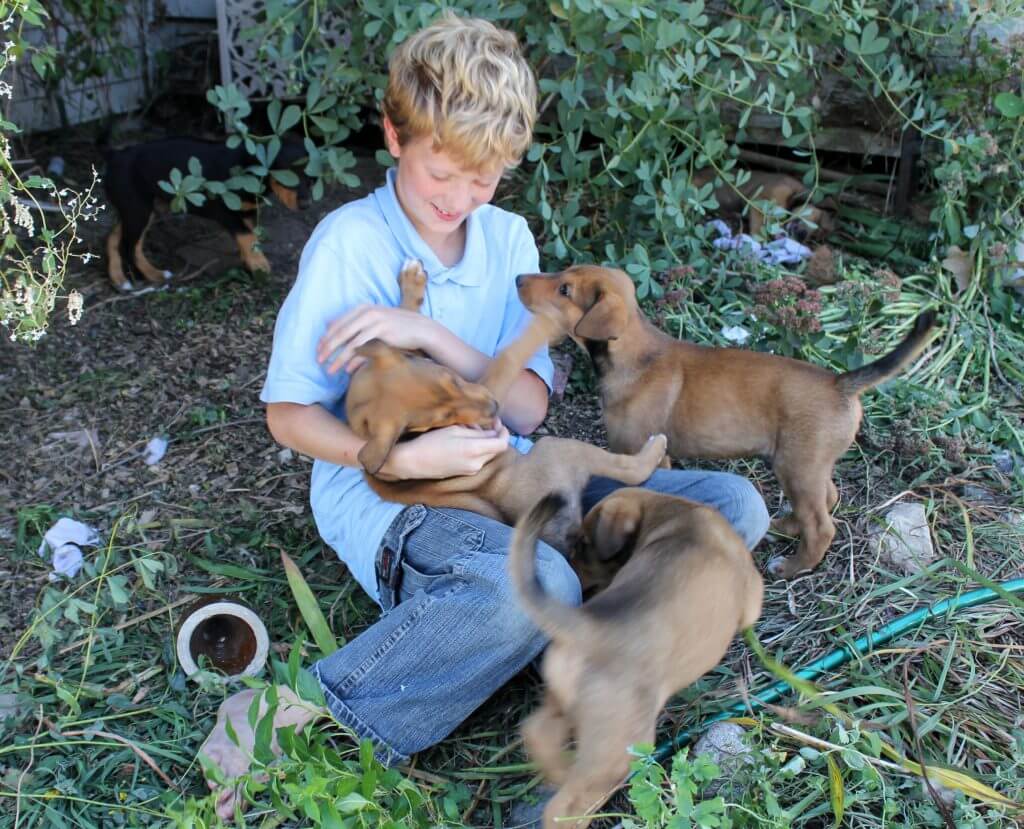
(But first, a cute picture of my boy and some puppies. I thought you might need that today. And if you need a puppy–because, really, who doesn’t?–send me a message. We still have a couple left.)
And . . . before we get started (cue subtitle) . . . just a few words about *shudder* predators.
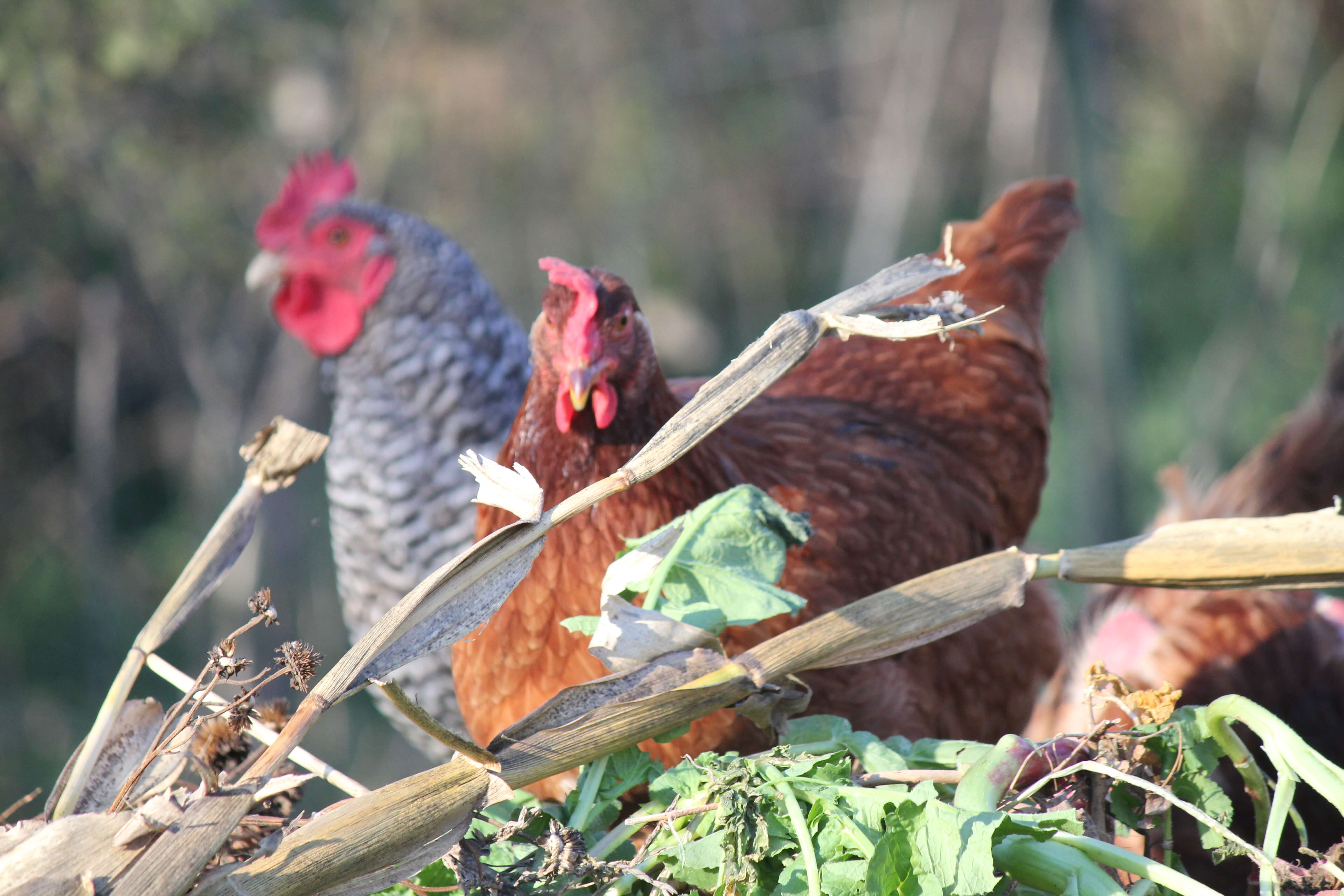
Here’s an interesting thing about predators with a taste for chicken blood: just when you think you’ve got them beat, they will surprise you. And not in a good way, either. They won’t bring you a cake, for example. Neither will they surprise you with a present when it’s not even your birthday. No.
Here’s what they will do, however . . . for example . . . we had enjoyed nearly two years without any predator pressure, when earlier this summer a large portion of my homestead flock was taken out by predators.
Alas! It was a heart-wrenching couple of weeks. But here was the surprising thing to me, after we finally stopped it and it (or they) moved on to make some other poor chicken-keeper-schmuck’s life difficult: I realized that my sense of loss over this unfortunate rout was not only for myself personally (shoot, I love my chickens!) but for my garden (shoot, I love my garden, too).
Because: I have a little garden-and-chicken-related secret. (Spoiler alert: hopefully you haven’t read the title of this piece yet?)
Are you ready?
Promise not to tell anybody? (Okay, just your best friends, then!)
Here it is: A decent portion of my success at gardening is due not to my green thumb, but to my stalwart little band of chickens.
Surprised?
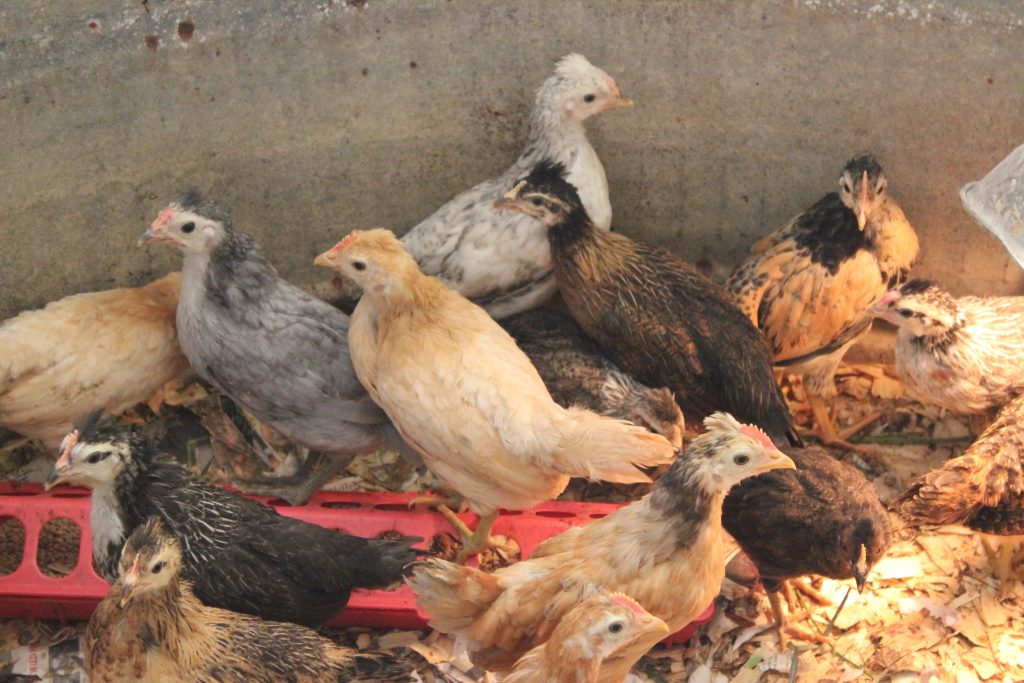
My Icelandic chicks. 🙂
They are fully my partners in profitable agricultural pursuits. 🙂
Hang in there with me, and I’ll explain. But first: you know that little bit of uneasiness you feel when people compliment you on something . . . and you feel like you really don’t deserve the accolades, because whatever it was that you did to impress them was so, so easy to do? This happens to me all. the. time. I get compliments on my artisan bread, for example, and I squirm because I know it took me approximately 10 seconds to make it.
I get applause for a pie that . . . my mother made (she always says “Just tell them you made it, Amy!” haha!).
Or. You raise these beautiful heirloom tomatoes, and a few other things besides, and when people see them–their beauty and quantity–they gasp and then study ordinary you, wondering what your secret is . . . you look so doggone unremarkable, after all, how is it that you grow such gorgeous stuff?
Take a gander.
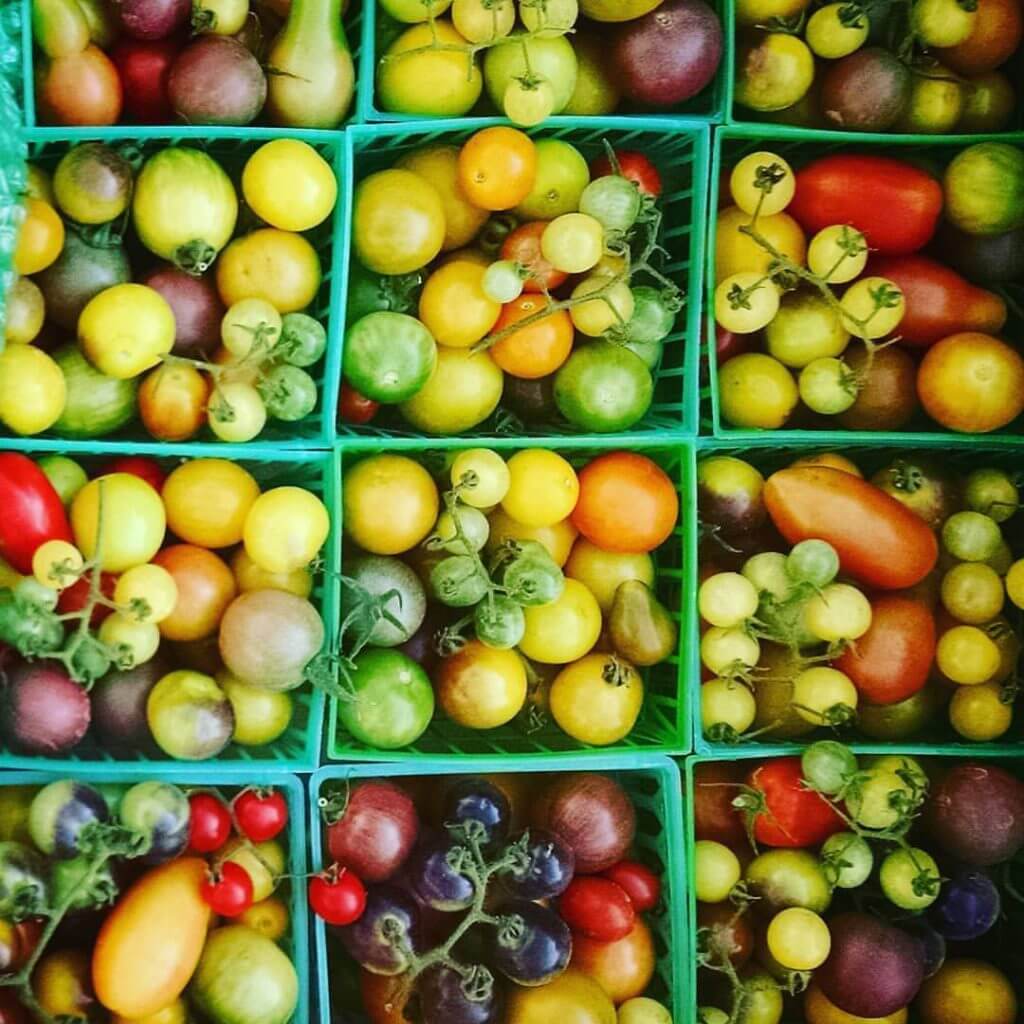
See? SEE? I absolutely do not do this by myself.
You smile demurely and look away, avoiding their steady, questioning gaze, because you don’t want them to know, really, you don’t . . . that much of the credit goes . . . to your flock o’chickens.
How can a bunch of raggedy chickens make such a difference in your garden, you may ask? Well, I’m fixing to tell you just that. But back to the predators, first. Hang in with me. I’ll get there.
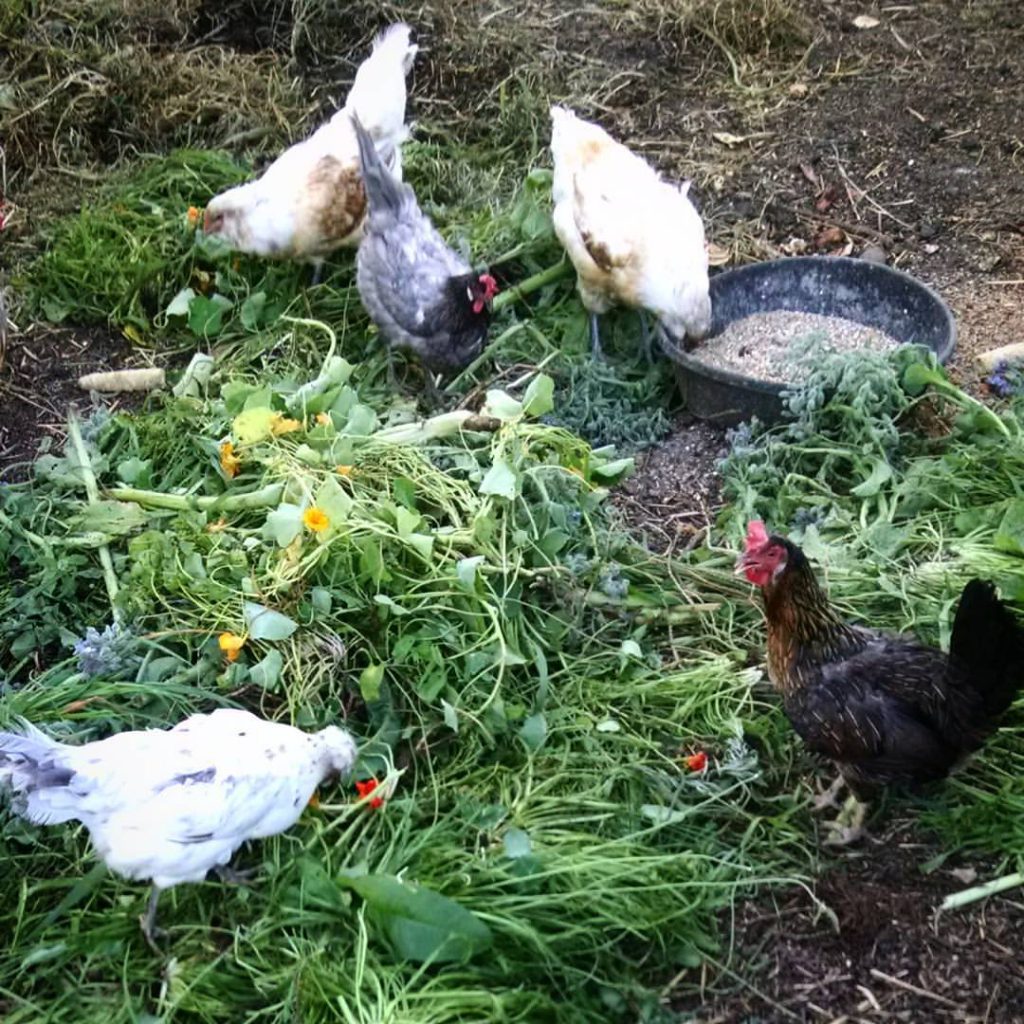
Here my chooks are helping me out by consuming some plants I tore out of my hoop house.
We’ve clashed heads (figuratively speaking) with the following predators (and probably more) at our place, in the decade-and-a-half that we’ve kept chickens:
- neighbors’ dogs (grr)
- feral cats (hiss)
- our cats (God bless ’em)
- coyotes
- opossums
- raccoons
- rats
- foxes
- more ‘coons
- probably other things that I’m not aware of
. . . and, this spring . . . (doggonit!) . . . We think we got minked. That is, discovered and targeted and cleaned out by minks.
It was awful. I’ve mentioned it before in one blog post or another this summer, but I’ve been too sorrowful about the events to write them all down. (Hot, angry tears aren’t exactly good for a computer keyboard, don’tcha know?) Now I’ll share. And no tears, I promise.
First, a definition of the mink’s modus operandi, from one of my favorite go-to chicken websites, Backyard Chickens.
Male minks run and hunt instead of rearing their young (*cough* deadbeat wildlife dads). Minks are vicious predators of chickens and other birds. They are known for their propensity to kill every chicken and bird in an area or pen. However, minks do not eat every chicken they prey on. They only want to drink the blood of their prey, and this is their motivation for killing every bird they can find. Despite their size, they have the quickness to surprise chickens. Their athletic prowess allows them to jump at chickens and grab the throat. With their long body and athletic ability, they can squeeze in any pen and attack on a bird easily. Minks can also attack anytime of the day and won’t hesitate to come back for more preys when it sees the opportunity to strike.
UGH. To make a long story short, before the mink and/or whatevers targeted our flock, I had seven lovely ducks, a goose, and about thirty chickens.
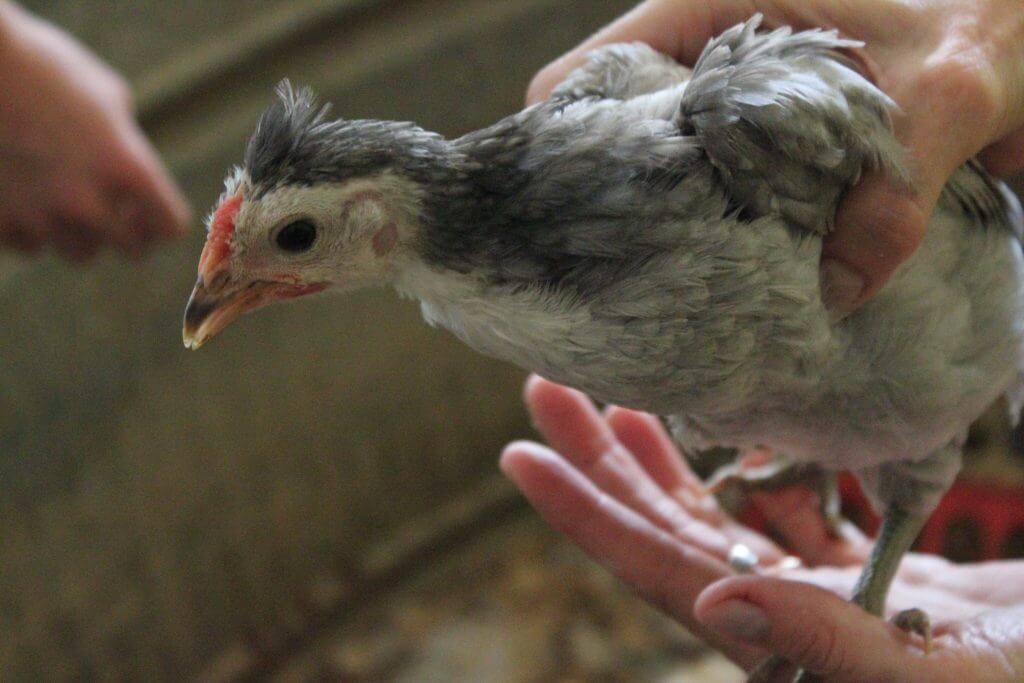
Raising chicks is a lot of trouble, true, but is totally worth it.
By the time we finally foiled the mink (and well, whatever, you know) I had no ducks, one terrified goose, and nine chickens left.
This predator didn’t tear the screens off the windows of the coop (like this one did) but it obviously gained access to the chickens inside the coop, even though we do have a sturdy concrete floor (eliminating tunneling options). We discovered, through perseverance and paying attention to subtle visual clues (like a dead chicken, for one, pulled through an opening less than an inch wide, and then left there, stuck) that whatever was getting them, was small and smart and could squeeze into a very skinny space. It moved aside heavy rocks from in front of the coop, to open the door. It removed heavy blocks from the back door, too. Everything I did to fortify the coop doors and protect my hens, was pushed aside and done away with.
The first kill was these lovely young ducks of ours. All four were killed in one night, and left in the coop: a grisly sight to find first thing in the morning, you must own.
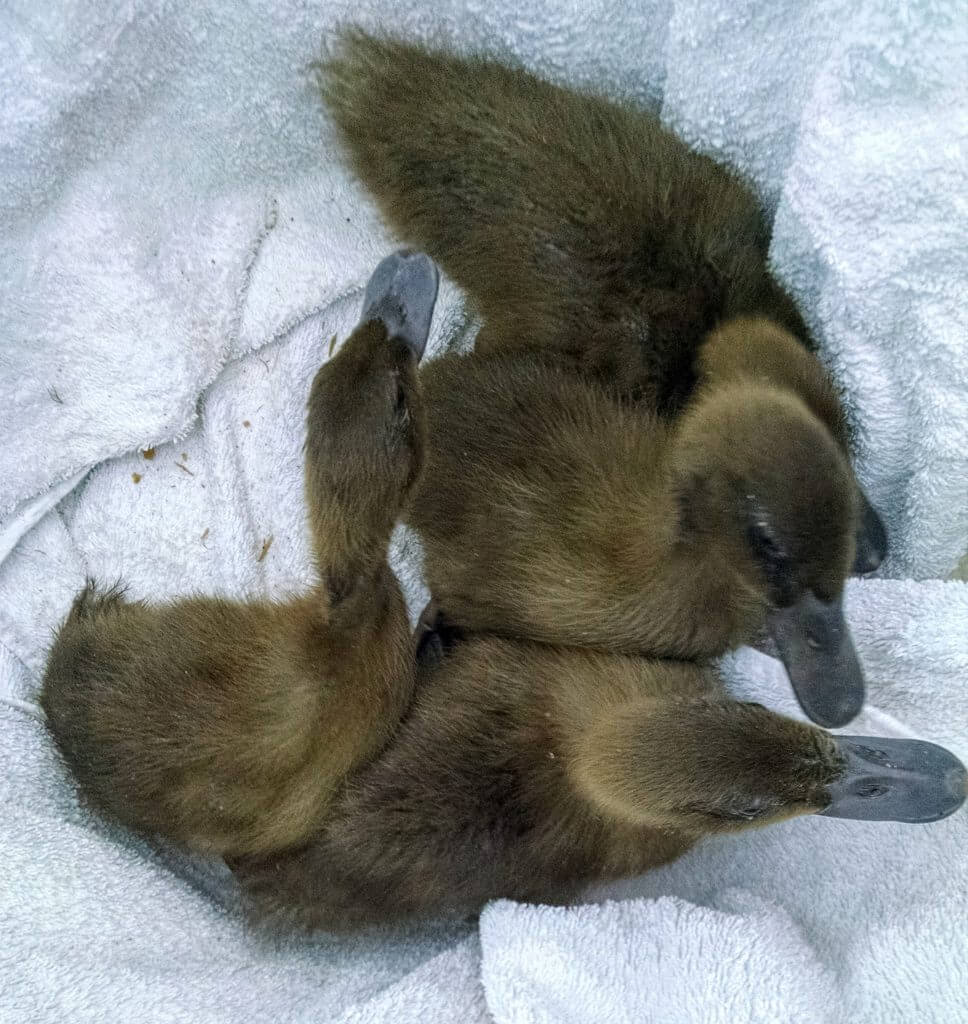
Precious, Lucky, Frollo, and I-can’t-remember-his-namesis.
We went right to work, baiting live traps and fortifying our coop to keep the critter out.
At one time, we had three live traps set up, with various baits–I don’t know how, but the critter somehow managed to slip into the traps, eat the bait, and then slip back out again. Sometimes the traps would be sprung, with no critter inside to show for it. Many times they would be standing open, but with the bait eaten. (Even peanut butter on the trigger plate, amazingly, was licked clean!)
Finally, Bryan had the time to rebuild the back door (thanks again, honey), adding a latch that kept the critter from opening the back door, and I finally discovered something that no critter could move: a couple of heavy 5-gallon buckets full of water–to prop the front door closed. The front door is still flimsy, and still needs to be rebuilt, too. (*hint* honey)
Oh. Another thing that was truly irritating about this predator/group of predators–they had some sort of a mean, punitive attitude towards me, too. When they were finally thwarted from killing and eating any more chickens, they started messing with other stuff. Bags of cracked corn and feed–stored in our chicken tractor/feed storage facility–were torn up. Buckets of sprouted grains (even when I placed them under heavy trash bins, with cement blocks on top!) were toppled, and the grains spread all over the ground.
It almost seemed as if the varmints were so angry that their fresh warm chicken supply was no longer accessible to them, that they decided to make me pay, by making my life more difficult.
Boo. Stupid, mean, wasteful things.
So. when the dust had cleared, and we enjoyed a few weeks with no new kills, and the live traps were not disturbed for several nights in a row, it seemed as if the current threat had passed.
It was then, as I watched my now-tiny chicken flock, out foraging for weeds and bugs, that I realized how much I really count on my fowl to contribute in a very real way to our farm. And I’m not merely referring to eggs and chicken meat, either.
If you’ve been on the fence about starting a flock of chickens at your house, you can take my word for it. Keeping a flock of chickens (and/or geese and ducks) can contribute to your gardening and farming efforts in the following very practical ways:
Number One: They eat bugs.
I still have bugs in my gardens (chickens will not eat all types of bugs, after all) but I don’t seem to have the same problems with certain bugs (grasshoppers, for example) that my non-chicken-keeping friends complain about. In fact, the first thing I thought, after the dust cleared and the varmint moved on, was “Now who will eat the bugs . . ??”
You may ask . . . but don’t the chickens do an awful lot of damage to your gardens? Potentially, yes. If I had, say, fifty chickens take up residence in any part of my garden for hours at a time, they could dig up little plantings and would certainly scratch deep holes in the dirt.
But I spend so much time outside that I can keep an eye on them. And I usually don’t let the flock out of their own yard until late afternoon, which lessens the chance that they’ll do much damage. A happy medium is that I let them out early enough in the day that they can flit about and get their fill of bugs, but not get bored enough to dig up baby radishes or put lacy holes into the lettuces.
Number two: They provide a ready and continuing source of fresh manure.
Ask me why my rhubarb is so beautiful. Go ahead, ask. My one (one!) reason that I believe my rhubarb is so abundant and pretty is that I top dress the rhubarb in the fall with chicken bedding (liberally laced with well-rotted chicken manure), when I clean out the coop for the winter. That’s it. Well. Of course I employ other common-sense gardening methods, as well: I keep it watered during dry stints, and try (try!!) to keep the weeds from occluding the actual rhubarb plants. There, now THAT’s it. And my rhubarb in the spring is absolutely beautiful. That’s anecdotal, I know.
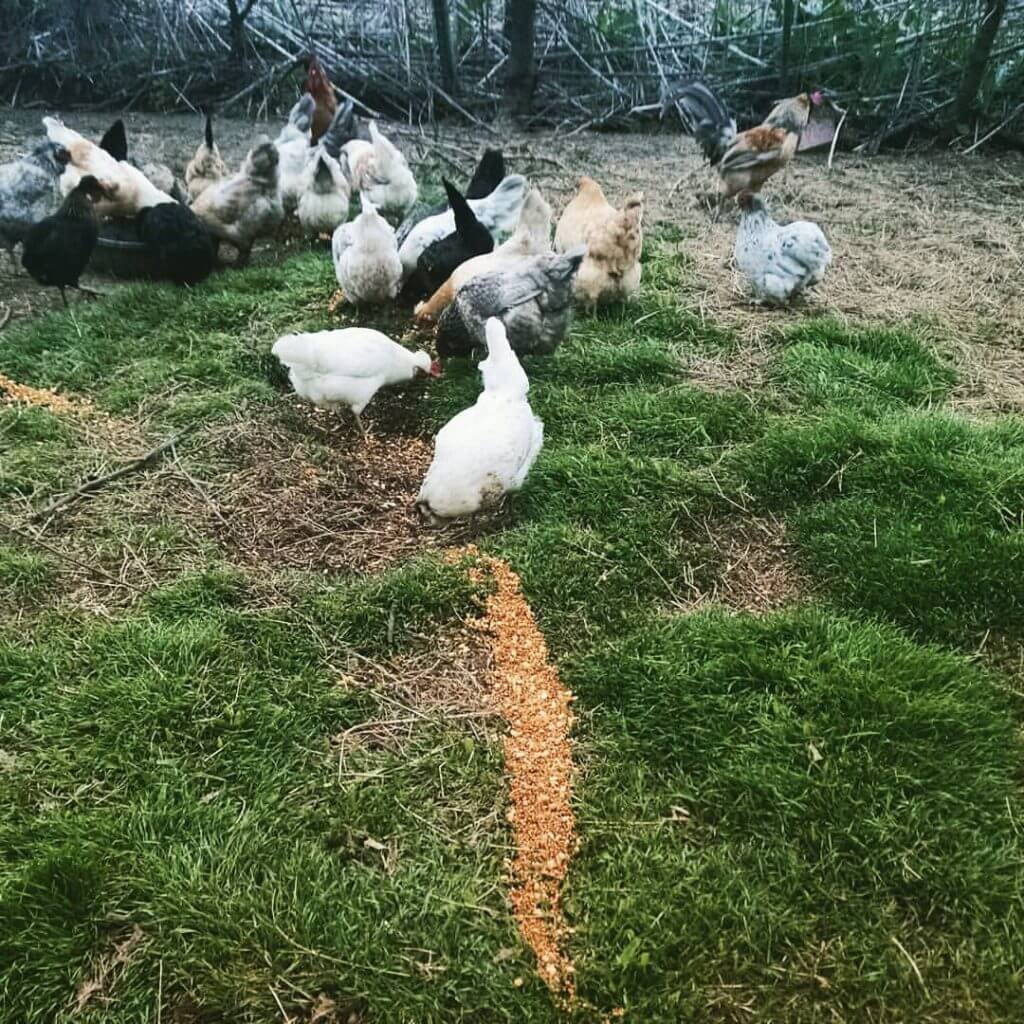
Ask me how nearly everything in my hoop house grows twice as big and pretty as it should. Go ahead, ask! Again, this is anecdotal, but every fall I work chicken bedding into all the beds in my hoop house. It’s my secret weapon in the fight against mediocre veg.
And my chickens are totally in on the secret. 🙂
And now, gentle reader, so are you. 🙂
And now, in the Word-to-the-Wise Department: remember that chicken manure is hot, and needs to be mixed with other ingredients and allowed to age before using it in your garden. Unless you happen to do what I do, stir it into the garden soil in the fall, so it has all winter long to age and cool down. 🙂
That’s it! So . . . if you’re thinking about raising chickens, but are not sure it’s worth the time and effort . . . and if you love to grow a garden . . . there are two solid reasons you may want to consider it. If you already have chickens, but are not availing yourself of the very real helpfulness of having them free-range at least some of the time, and using their bedding in your garden . . . well! Hopefully this post has opened your eyes to some new possibilities!
If you find any value from this post, would you consider sharing it with your friends? I’d love that. 🙂 And it would indicate to me that I’m writing what you like to read. 🙂 And that means a lot to me.
And hey. Here’s a link to my new ebook: “Secret Chicken Knowledge: I’m Full of it!” It’s chock-full of helpful tips and tricks for chicken-devotees like yourself. Check it out!
- My new ebook “Secret Chicken Knowledge: I’m Full of It!” is here!
- Day of Panic Sauteed Cherry Tomatoes in Butter & Herbs


Last fall I used my chicken manure on the beds I was planning on planting tomatoes in this year. I had the best tomatoes EVER! It truly is great fertilizer.
Yep, I do agree, Julie!
Wow, you mean you still don’t know what was killing your chickens? Maria has two of the dogs that need to be kept locked on the other side of the chicken area or they will kill her flock. I get very upset because I think that is a terrible way to die even for a chicken. I have asked her to find a home for the two dogs but she does not listen to me. I think that cutting back the pack from 11 to 8 or 9 would be fine. Maria feels nobody else in the world would give them the same love. In a thunderstorm, she will have all 11 staying dry in the front room. I think they should have their own dog house and kennel. I don’t have a voice in the matter. The dogs also destroyed my garden this season. Next planting will be in a raised garden that I am already planning at the moment. Just don’t tell her. She will never notice it because it is not in the area she and her beloved chickens hang out.
I dearly love your Maria and her big heart, Chef, but 11 dogs . . . ! Especially if they are a threat to her chicken flock and your veg garden, that is a lot of canine energy to corral!!
Amy, I’m a lurker. I teach college writing at a Midwest university, and Vomiting Chicken is one of my guilty pleasures. I doubt I will ever raise a veg or own a chicken, but just reading about your exploits reminds me when I am grading or just kind of blue that there is another world outside my walls.
I also am a learning junkie. I love hearing about how other people do what they do. Every time I see a VC post in my virtual mailbox, I know I am in for a treat. Thanks for all you do!
Aww Leslie, dear lurker, thank you for this very sweet comment. You can’t imagine what a lift it gave me. And I hope that if it’s your desire to raise a chicken or a squash, that someday soon you’ll be able to. If not, I’ll keep sharing about our exploits out here on the prairie. *blessings*
Your article brought tears to my eyes as I am still upset over the Great Labor Day massacre of 2017 that killed all of our chickens. We are beginning to suspect a mink too. Luckily we had 3 young birds that we had hatched from eggs still in our garage that were not harmed.
Oh! I am so sad for you, Sue. It is so heartbreaking to have a big chicken loss like that. I’ve had my chooks killed so many times. A mink, they say, will come back and get every one. Drat!! Have you tried a live trap? I’ve tried to keep my live traps on the ready, but a mink is so small and so canny that I’ve never caught one before. Ugh!!
Hi Amy,
I look to your posts for lessons and ideas on raising chickens. We have had our share of dogs and coyote incidences over the last 17 years, but this year has been particularly daunting. A few months ago we had 33 chickens. Now there are 16 left. A lone coyote seems to be the problem. He, probably she, comes at any time of the day and we can’t sit out by the coop from dawn to dusk! We keep our free ranging girls locked in the pen for a spell, then try again. For a few days they’re good and then wham, coyote hits again. My question. Is a live trap good to catch coyotes in and what kind of bait would I use..
Thanks for sharing all your experience with us!!!
Mary Lee, we’ve never caught a coyote, but we did buy a live trap a few years ago that is big enough to catch one! As far as bait goes, peanut butter is supposedly effective at catching nearly any predator. I have gone back to this website several times to educate myself about baiting traps for predators. I recommend it! (And good luck!! I am rooting for you!!)
http://www.havahart.com/how-to-bait
Very well written. Thank you.
It seems like predators have been working overtime this year! I know of a few and read often of chicken keepers loosing their entire flocks!
me too, Barb! Sad!
I’m sorry for your losses! Last Wednesday we lost our main rooster, Leonardo, to a coyote. He was so horrible to us humans but such a good husband to his 34 wives! I cried real tears for him the next day when I went out to do chores and all of his girls were still in their rafter beds CRYING!!! They were making this tragic little croony noise I had never heard before!! He died a hero’s death though. He laid down his life so his hens could escape. I still get misty just writing this! Maybe I need to get out more! 🙂
Oh, Connie, I am sorry! Rest in Peace, brave Leonardo! I am hoping that you have a secondary roo? (Maybe we BOTH need to get out more–ha!)